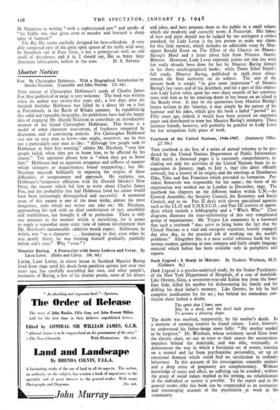Shorter Notices
Fox. By Christopher Hobhouse. With a Biographical Introduction by Harold Nicolson. (Constable and John Murray. 12s. 6d.) THIS reissue of Christopher Hobhouse's study of Charles James Fox (first published in 1934) is very welcome. The book was written when its author was twenty-five years old ; a few days after his thirtieth birthday Hobhouse was killed by a direct hit on a fort at Portsmouth, in the Battle of Britain summer. In republishing this solid and reputable biography, the publishers have had the happy idea of engaging Mr. Harold Nicolson to contribute an introductory memoir of his friend Christopher Hobhouse. This !essay is a model of sober character assessment, of frankness tempered by discretion, and of convincing analysis. For Christopher Hobhouse was not an easy man to know—one might, moreover, say he was not a particularly easy man to like : " Although few people took to Hobhouse at their first meeting," admits Mr. Nicolson, " very few people failed, when they got to know him, to be affected by his charm." The operative phrase here is " when they got to know him." Hobhouse had an apparent arrogance and stiffness of manner which strangers ,or acquaintances found unappealing ; but Mr. Nicolson succeeds brilliantly in exposing the origins of these difficulties of temperament and approach. He explains, too, Hobhouse's 'temporary affiliation with Sir Oswald Mosley's New Party, the reasons which led him to. write about Charles James Fox, and the probability that had Hobhouse lived his career would have been increasingly distinguished and successful. A memorial essay of this nature is one of the most tricky, almost the most dangerous, tasks which any writer can take on: Mr. Nicolson, approaching his task with an ideal combination of tact, sensibility and truthfulness, has brought it off to perfection. There is only one sentence in the memoir which is mystifying, for it seems to imply a somewhat more static view of human development than Mr. Nicolson's innumerable rdmirers would expect. Hobhouse, he writes, was " as a character . . . fascinating in that, even when he was _nearly thirty, he was forming himself gradually, painfully before one's eyes." Why " even" ?






























 Previous page
Previous page